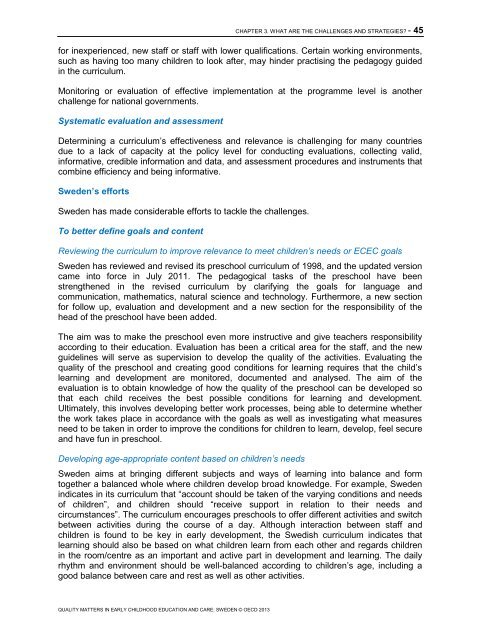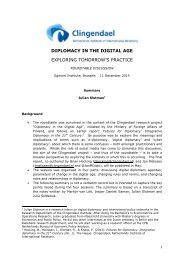SWEDEN%20policy%20profile%20-%20published%2005-02-2013
SWEDEN%20policy%20profile%20-%20published%2005-02-2013
SWEDEN%20policy%20profile%20-%20published%2005-02-2013
Create successful ePaper yourself
Turn your PDF publications into a flip-book with our unique Google optimized e-Paper software.
QUALITY MATTERS IN EARLY CHILDHOOD EDUCATION AND CARE: SWEDEN © OECD <strong>2013</strong><br />
CHAPTER 3. WHAT ARE THE CHALLENGES AND STRATEGIES? - 45<br />
for inexperienced, new staff or staff with lower qualifications. Certain working environments,<br />
such as having too many children to look after, may hinder practising the pedagogy guided<br />
in the curriculum.<br />
Monitoring or evaluation of effective implementation at the programme level is another<br />
challenge for national governments.<br />
Systematic evaluation and assessment<br />
Determining a curriculum’s effectiveness and relevance is challenging for many countries<br />
due to a lack of capacity at the policy level for conducting evaluations, collecting valid,<br />
informative, credible information and data, and assessment procedures and instruments that<br />
combine efficiency and being informative.<br />
Sweden’s efforts<br />
Sweden has made considerable efforts to tackle the challenges.<br />
To better define goals and content<br />
Reviewing the curriculum to improve relevance to meet children’s needs or ECEC goals<br />
Sweden has reviewed and revised its preschool curriculum of 1998, and the updated version<br />
came into force in July 2011. The pedagogical tasks of the preschool have been<br />
strengthened in the revised curriculum by clarifying the goals for language and<br />
communication, mathematics, natural science and technology. Furthermore, a new section<br />
for follow up, evaluation and development and a new section for the responsibility of the<br />
head of the preschool have been added.<br />
The aim was to make the preschool even more instructive and give teachers responsibility<br />
according to their education. Evaluation has been a critical area for the staff, and the new<br />
guidelines will serve as supervision to develop the quality of the activities. Evaluating the<br />
quality of the preschool and creating good conditions for learning requires that the child’s<br />
learning and development are monitored, documented and analysed. The aim of the<br />
evaluation is to obtain knowledge of how the quality of the preschool can be developed so<br />
that each child receives the best possible conditions for learning and development.<br />
Ultimately, this involves developing better work processes, being able to determine whether<br />
the work takes place in accordance with the goals as well as investigating what measures<br />
need to be taken in order to improve the conditions for children to learn, develop, feel secure<br />
and have fun in preschool.<br />
Developing age-appropriate content based on children’s needs<br />
Sweden aims at bringing different subjects and ways of learning into balance and form<br />
together a balanced whole where children develop broad knowledge. For example, Sweden<br />
indicates in its curriculum that “account should be taken of the varying conditions and needs<br />
of children”, and children should “receive support in relation to their needs and<br />
circumstances”. The curriculum encourages preschools to offer different activities and switch<br />
between activities during the course of a day. Although interaction between staff and<br />
children is found to be key in early development, the Swedish curriculum indicates that<br />
learning should also be based on what children learn from each other and regards children<br />
in the room/centre as an important and active part in development and learning. The daily<br />
rhythm and environment should be well-balanced according to children’s age, including a<br />
good balance between care and rest as well as other activities.








